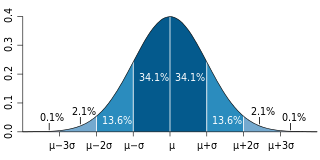Related Research Articles

Free will is the notional capacity or ability to choose between different possible courses of action unimpeded.

Determinism is the philosophical view that events are completely determined by previously existing causes. Deterministic theories throughout the history of philosophy have developed from diverse and sometimes overlapping motives and considerations. Like eternalism, determinism focuses on particular events rather than the future as a concept. The opposite of determinism is indeterminism, or the view that events are not deterministically caused but rather occur due to chance. Determinism is often contrasted with free will, although some philosophers claim that the two are compatible.

The term incompatibilism was coined in the 1960s, most likely by philosopher Keith Lehrer, to name the view that the thesis of determinism is logically incompatible with the classical thesis of free will. The term compatibilism was coined to name the view that the classical free will thesis is logically compatible with determinism, i.e. it is possible for an ordinary human to exercise free will even in a universe at which determinism is true. These terms were originally coined for use within a research paradigm that was dominant among academics during the so-called "classical period" from the 1960s to 1980s, or what has been called the "classical analytic paradigm". Within the classical analytic paradigm, the problem of free will and determinism was understood as a Compatibility Question: "Is it possible for an ordinary human to exercise free will when determinism is true?" Those working in the classical analytic paradigm who answered "no" were incompatibilists in the original, classical-analytic sense of the term, now commonly called classical incompatibilists; they proposed that determinism precludes free will because it precludes our ability to do otherwise. Those who answered "yes" were compatibilists in the original sense of the term, now commonly called classical compatibilists. Given that classical free will theorists agreed that it is at least metaphysically possible for an ordinary human to exercise free will, all classical compatibilists accepted a compossibilist account of free will and all classical incompatibilists accepted a libertarian account of free will.
Fatalism is a family of related philosophical doctrines that stress the subjugation of all events or actions to fate or destiny, and is commonly associated with the consequent attitude of resignation in the face of future events which are thought to be inevitable.
Compatibilism is the belief that free will and determinism are mutually compatible and that it is possible to believe in both without being logically inconsistent.

Libertarianism is one of the main philosophical positions related to the problems of free will and determinism which are part of the larger domain of metaphysics. In particular, libertarianism is an incompatibilist position which argues that free will is logically incompatible with a deterministic universe. Libertarianism states that since agents have free will, determinism must be false and vice versa.

Hard determinism is a view on free will which holds that determinism is true, that it is incompatible with free will, and therefore that free will does not exist. Although hard determinism generally refers to nomological determinism, it can also be a position taken with respect to other forms of determinism that necessitate the future in its entirety.

Ted Honderich is a Canadian-born British professor of philosophy, who was Grote Professor Emeritus of the Philosophy of Mind and Logic, University College London.
Predeterminism is the philosophy that all events of history, past, present and future, have been already decided or are already known, including human actions.
Peter van Inwagen is an American analytic philosopher and the John Cardinal O'Hara Professor of Philosophy at the University of Notre Dame. He is also a research professor of philosophy at Duke University each spring. He previously taught at Syracuse University, earning his PhD from the University of Rochester in 1969 under the direction of Richard Taylor. Van Inwagen is one of the leading figures in contemporary metaphysics, philosophy of religion, and philosophy of action. He was the president of the Society of Christian Philosophers from 2010 to 2013.
Theological determinism is a form of predeterminism which states that all events that happen are pre-ordained, and/or predestined to happen, by one or more divine beings, or that they are destined to occur given the divine beings' omniscience. Theological determinism exists in a number of religions, including Jainism, Judaism, Christianity, and Islam. It is also supported by proponents of Classical pantheism such as the Stoics and by philosophers such as Baruch Spinoza.
The free will theorem of John H. Conway and Simon B. Kochen states that if we have a free will in the sense that our choices are not a function of the past, then, subject to certain assumptions, so must some elementary particles. Conway and Kochen's paper was published in Foundations of Physics in 2006. In 2009, the authors published a stronger version of the theorem in the Notices of the American Mathematical Society. Later, in 2017, Kochen elaborated some details.
Higher-order volitions, as opposed to action-determining volitions, are volitions about volitions. Higher-order volitions are potentially more often guided by long-term beliefs and reasoning. A higher-order volition can go unfulfilled due to uncontrolled lower-order volitions.
Democratic rationalization is term used by Andrew Feenberg in his article "Subversive Rationalization: Technology, Power and Democracy with technology." Feenberg argues against the idea of technological determinism citing flaws in its two fundamental theses. The first is the thesis of unilinear progress. This is the belief that technological progress follows a direct and predictable path from lower to higher levels of complexity and that each stage along this path is necessary for progress to occur.
Technological somnambulism is a concept used when talking about the philosophy of technology. The term was used by Langdon Winner in his essay Technology as forms of life. Winner puts forth the idea that we are simply in a state of sleepwalking in our mediations with technology. This sleepwalking is caused by a number of factors. One of the primary causes is the way we view technology as tools, something that can be put down and picked up again. Because of this view of objects as something we can easily separate ourselves from technology, and so we fail to look at the long term implications of using that object. A second factor is the separation of those who make the technology and those who use the technology. This division causes there to be little thought and research going into the effects of using/developing that technology. The third and most important idea is the way in which technology seems to create new worlds in which we live. These worlds are created by the restructuring of the common and seemingly everyday things around us. In most situations the changes take place with little attention or care from us because we are more focused on the menial aspects of the technology.
Illusionism is a metaphysical theory about free will first propounded by professor Saul Smilansky of the University of Haifa. Although there exists a theory of consciousness bearing the same name (illusionism), it is important to note that the two theories are concerned with different subjects.
Free will in antiquity is a philosophical and theological concept. Free will in antiquity was not discussed in the same terms as used in the modern free will debates, but historians of the problem have speculated who exactly was first to take positions as determinist, libertarian, and compatibilist in antiquity. There is wide agreement that these views were essentially fully formed over 2000 years ago. Candidates for the first thinkers to form these views, as well as the idea of a non-physical "agent-causal" libertarianism, include Democritus, Aristotle, Epicurus, Chrysippus, and Carneades.
Technological determinism is a reductionist theory that assumes that a society's technology progresses by following its own internal logic of efficiency, while determining the development of the social structure and cultural values. The term is believed to have originated from Thorstein Veblen (1857–1929), an American sociologist and economist. The most radical technological determinist in the United States in the 20th century was most likely Clarence Ayres who was a follower of Thorstein Veblen and John Dewey. William Ogburn was also known for his radical technological determinism and his theory on cultural lag.
The consequence argument is an argument against compatibilism popularised by Peter van Inwagen. The argument claims that if agents have no control over the facts of the past then the agent has no control of the consequences of those facts.
Abilities are powers an agent has to perform various actions. They include common abilities, like walking, and rare abilities, like performing a double backflip. Abilities are intelligent powers: they are guided by the person's intention and executing them successfully results in an action, which is not true for all types of powers. They are closely related to but not identical with various other concepts, such as disposition, know-how, aptitude, talent, potential, and skill.
References
- ↑ "Semicompatibilism". www.informationphilosopher.com.
- ↑ "Semi-Compatibilism - Bibliography - PhilPapers". philpapers.org.